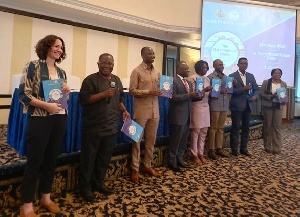Business News of Tuesday, 3 June 2025
Source: www.ghanawebbers.com
Majority of citizens feel left out of national decision-making – GSS survey
A recent report reveals that over 70 percent of respondents feel the political system in Ghana offers little opportunity for citizens to influence decisions. This indicates limited public participation and a perception of unresponsiveness from decision-makers.
These findings come from the Governance Series Wave 1 Report. The survey tracks citizen experiences with governance in Ghana. Data was collected by the GSS using Computer-Assisted Telephone Interviewing (CATI) from January 2 to 20, 2025. It covers experiences from January to December 2024.
The survey included 7,248 respondents selected from a sample of 15,400 households based on the 2021 Population and Housing Census. It serves as a baseline for measuring progress on Sustainable Development Goal (SDG) 16.7.2, which focuses on inclusive decision-making.
According to the report, only 12 percent of respondents believe the political system allows significant citizen participation. In contrast, more than seven out of ten Ghanaians feel disconnected and disenfranchised.
Young people aged 18–24 reported the highest levels of exclusion. About 55 percent said they have no input in government decisions. Older citizens aged 65 and above also felt sidelined; nearly half reported no influence.
Women, rural residents, and people with disabilities also reported higher rates of exclusion. For example, 47.4 percent of people living with disabilities felt completely excluded. This percentage rose to 66.9 percent among those with self-care difficulties.
Rural Ghanaians were more likely to report having "no say" in governance compared to urban residents—45.8% versus 40.5%.
The findings show stark regional disparities in citizen participation across Ghana. The Volta (62.2%), Upper East (61.8%), and North East (58%) Regions had the highest levels of exclusion regarding decision-making input.
Conversely, Eastern (20.3%), Oti (19.6%), and Upper West (18.3%) Regions had more respondents who felt they had significant influence in governance decisions.
These disparities raise questions about local governance effectiveness and civic engagement initiatives across different regions.
At the report launch in Accra, Government Statistician Dr. Alhassan Iddrisu stressed the need for a genuinely participatory governance system. He emphasized that governance reform is essential for meeting all Ghanaians' needs and aspirations.
Dr. Iddrisu stated that every Ghanaian should feel seen, heard, and served by their government regardless of status or circumstance.
He announced that the Governance Series will be conducted bi-annually to monitor changes in citizen experiences and inform policy interventions.











